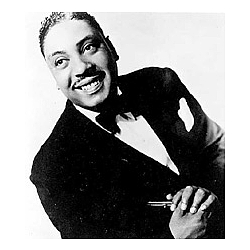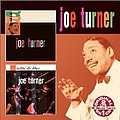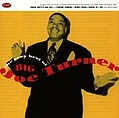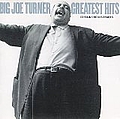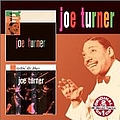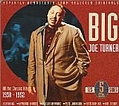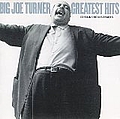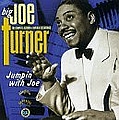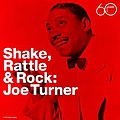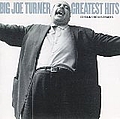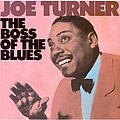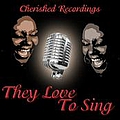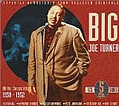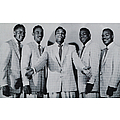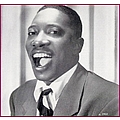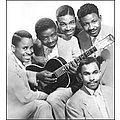Big Joe Turner Biography
Big Joe Turner (Joseph Vernon Turner Jr., Kansas City, Missouri, May 18, 1911 – Inglewood, California, November 24, 1985) was an American blues shouter. Although he came to his greatest fame in the 1950s with his pioneering rock and roll recordings, particularly "Shake, Rattle and Roll", Turner's career as a performer stretched from the 1920s into the 1980s. Known variously as The Boss of the Blues, and Big Joe Turner (due to his 6'2", 300+ lbs stature), Turner was born in Kansas City and first discovered his love of music through involvement in the church. Turner's father was killed in a train accident when Joe was only four years old. He began singing on street corners for money, leaving school at age fourteen to begin working in Kansas City's club scene, first as a cook, and later as a singing bartender. He eventually became known as The Singing Barman, and worked in such venues as The Kingfish Club and The Sunset, where he and his piano playing partner Pete Johnson became resident performers. The Sunset was managed by Piney Brown. It featured "separate but equal" facilities for white patrons. Turner wrote "Piney Brown Blues" in his honor and sang it throughout his entire career. At that time Kansas City was a wide-open town run by "Boss" Tom Pendergast. Despite this, the clubs were subject to frequent raids by the police, but as Turner recounts, "The Boss man would have his bondsmen down at the police station before we got there. We'd walk in, sign our names and walk right out. Then we would cabaret until morning". His partnership with boogie-woogie pianist Pete Johnson proved fruitful. Together they headed to New York in 1936, where they appeared on a bill with Benny Goodman, but as Turner recounts, "After our show with Goodman, we auditioned at several places, but New York wasn't ready for us yet, so we headed back to K.C.". Eventually they were spotted by the talent scout, John H. Hammond in 1938, who invited them back to New York to appear in one of his "From Spirituals to Swing" concerts at Carnegie Hall, which was instrumental in introducing jazz and blues to a wider American audience. Due in part to their appearance at Carnegie Hall, Turner and Johnson scored a major hit with "Roll 'Em Pete". The track contained one of the earliest recorded examples of a back beat. It was a song which Turner recorded many times, with various combinations of musicians, over the ensuing years. In 1939, along with boogie players Albert Ammons and Meade Lux Lewis, they began a residency at Café Society, a club in New York City, where they appeared on the same bill as Billie Holiday and Frank Newton's band. Besides "Roll 'em, Pete", Turner's best-known recordings from this period are probably "Cherry Red", "I Want a Little Girl" and "Wee Baby Blues". In 1941, he headed to Los Angeles where he performed in Duke Ellington's revue Jump for Joy in Hollywood. He appeared as a singing policeman in a sketch called "He's on the Beat." Los Angeles became his home base for a time, and in 1944 he worked in Meade Lux Lewis's Soundies musical films. Although he sang on the soundtrack recordings, he was not present for the filming, and his vocals were mouthed by comedian Dudley Dickerson for the camera. In 1945 Turner and Pete Johnson opened their own bar in Los Angeles, The Blue Moon Club. Turner made lots of records, not only with Johnson but with the pianists Art Tatum and Sammy Price and with various small jazz ensembles. He recorded on several record labels, particularly National Records, and also appeared with the Count Basie Orchestra. In his career, Turner successively led the transition from big bands to jump blues to rhythm and blues, and finally to rock and roll. Turner was a master of traditional blues verses and at the legendary Kansas City jam sessions he could swap choruses with instrumental soloists for hours. In 1951, while performing with the Count Basie Orchestra at Harlem's Apollo Theater as a replacement for Jimmy Rushing, he was spotted by Ahmet and Nesuhi Ertegün, who signed him to their new recording company, Atlantic Records. Turner recorded a number of hits for them, including the blues standards, "Chains Of Love" and "Sweet Sixteen". Many of his vocals are punctuated with shouts to the band members, as in "Boogie Woogie Country Girl" ("That's a good rockin' band!", "Go ahead, man! Ow! That's just what I need!" ) and "Honey Hush" (he repeatedly sings "Hi-yo, Silver!", probably in reference to The Treniers singing the phrase in their Lone Ranger parody "
Top Big Joe Turner Lyrics
Write a comment
What do you think about Big Joe Turner? Let us know in the comments below!
Big Joe Turner Albums
Similar artists
- Chuck WillisBlues/Soul
- The CloversSoul
- Lavern BakerBlues/Soul
- Ruth BrownBlues/Jazz/Soul
- Clyde Mcphatter60s/Soul
